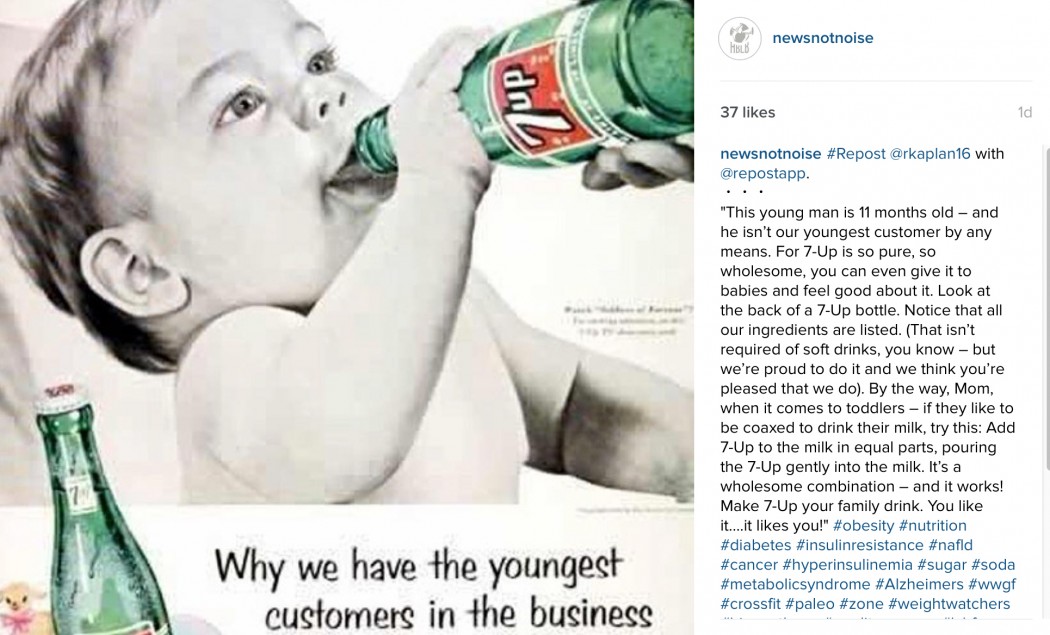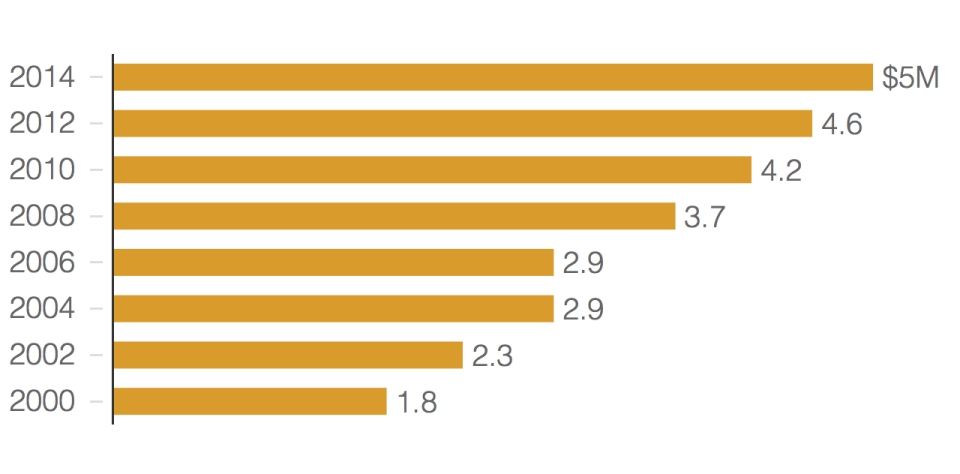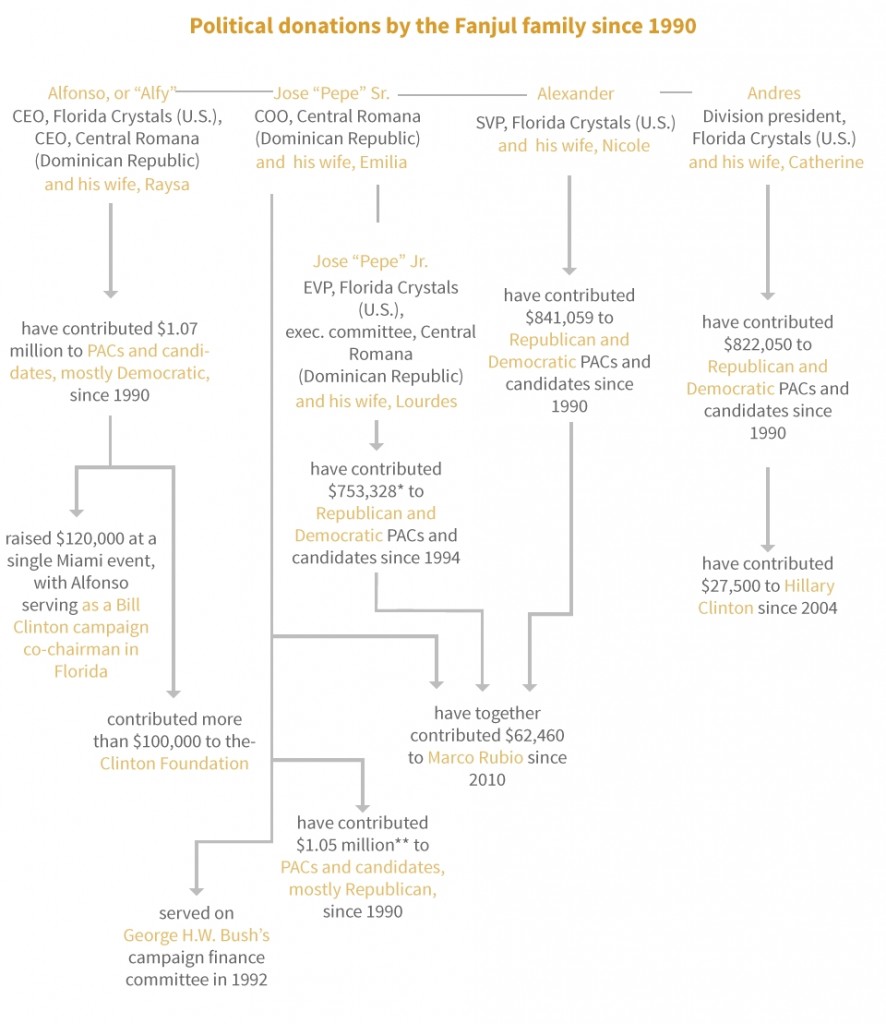It feel like HBLB is waging war on sugar, while that’s not our intension, it does seem more and more information is coming out about the nastiness of the sweet stuff. It is slowly killing us, with around 10 percent of the US population diagnosed Type Two Diabetes and according the CDC another 8 million who are have Type 2 but are undiagnosed. Now, as posted on Instagram this week, we have “Type Three Diabetes, aka Alzhiemers, with researchers noting the devastating toll a high sugar diet takes on the brain. Our number five pick for you this week looks at the business side of sugar. When you think about the damage sugar is doing, it makes logical sense that the machine peddling the stuff must be pretty determined, and here we learn just how cutthroat it is. From briding our elected officials in the form of lobbying to their terrible treatment of workers and other archaic practices most akin to slavery it seems a boycott on sugar is good for our bodies and our souls. When you read this think about the tobacco industry of years past… feels awfully similar. Here’s the piece from Al Jazeera America:
In 2013, after a two-year investigation, the department issued a report expressing concern that the Dominican government might be failing to protect sugar workers. The report was followed by three reviews, one every six months, that found working conditions still lacking. But as the DOL pushed for reform in Dominican sugar, members of Congress and other politicians maintained lucrative relationships with the royal family of cane: the Fanjuls.
The four Fanjul brothers have an outsize presence in both the Dominican Republic and the United States. In the DR, their American company, Central Romana, produces most of the country’s sugar. In the U.S., the Fanjuls also grow cane and spend heavily in Washington, ranking among the sugar industry’s top political donors and biggest spenders on lobbying. As big players in both countries, they benefit from a highly profitable combination of factors: In the DR, Central Romana pays some of the lowest wages in the country, produces most of the country’s allotment of sugar exported to the U.S. and, thanks to CAFTA-DR, pays dwindling tariffs for those exports. Meanwhile, in the U.S., the Fanjuls sell their sugar at sometimes two to three times the global market price, thanks to import limits and price supports.
It’s the consummate immigrant success story. The Fanjul brothers and one sister, Alfonso, José, Andres, Alexander and Lian, come from a long line of powerful Cuban sugar producers. After Fidel Castro came to power in 1959, the family fled to Florida. They began growing cane in and around the Everglades and in the 1980s expanded production to the Dominican Republic, where their company is now the country’s largest private landowner and employer.
In the United States, too, the Fanjuls are among the biggest cane growers, and they co-own the world’s largest refining company, American Sugar Refining, also known as ASR, which markets its product under the brand names Domino, C&H, Redpath, Tate & Lyle and Florida Crystals. The group owns or is a major shareholder in refineries in four U.S. states and six other countries. While the brothers run the business, Lian tends to the charities she founded to help people living in poverty near the Fanjuls’ business operations in Florida and the Dominican Republic. Representatives of the Fanjuls, including their companies and charities in the DR and Florida, declined to be interviewed for this article.
Source: Center for Responsive Politics: Political contributions by cane and beet sugar industries to congressional candidates
Despite their international holdings, the Fanjuls have kept their focus on ensuring that their U.S. operations are as secure and profitable as possible, with little pushback from the government. In last year’s election cycle, the Florida Crystals political action committee and the company’s employees together contributed more than $860,000 to candidates and political spending groups. Also in 2014, Florida Crystals spent more than $1 million lobbying Congress, the U.S. Departments of Agriculture and Commerce, and the Office of the U.S. Trade Representative, largely on import tariffs and policies on biofuels and clean water.
The sugar industry, too, is a heavy donor. According to the nonpartisan research group Center for Responsive Politics, the industry gave more than $5 million to members of Congress in the last election cycle, an all-time high. What the industry gets in return for all this are domestic controls and import tariffs that keep prices up and profits high for U.S. sugar producers, perpetuating a controversial system.
Sugar is “more dependent on government support or protection than any other agricultural industry in this country,” says Daniel Pearson, senior fellow of trade policy studies at the Cato Institute, a libertarian think tank. “Government has tended to look out for them, so it is a symbiotic relationship.” The price support system, known as the sugar program, is reinserted into the U.S. farm bill every time it comes up for renewal. The program limits the amount of sugar on the U.S. market, whether imported or grown domestically, to keep prices higher than they are everywhere else. And if there is a glut in the market, the U.S. government buys the surplus, which can cost taxpayers hundreds of millions of dollars.
The Fanjul family donates to legislators of both parties as well. Alfonso, aka Alfy, consistently supports Democratic candidates and causes, while his younger brother José, aka Pepe, does the same for Republicans. And two longtime family favorites are current presidential candidates: Hillary Clinton and Sen. Marco Rubio. According to the Center for Responsive Politics, Florida Crystals’ employees and dependents rank among Rubio’s top five contributors since 2009.
Ahead of the 2008 presidential elections, Andres directly contributed almost three times as much as Alfy did to Hillary Clinton’s campaign, but Alfonso’s relationship with the Clintons is more well-known. The Alfonso Fanjul-Bill Clinton friendship dates to Clinton’s first run for president in 1992, when Fanjul co-chaired his campaign in Florida. And after Fanjul visited Cuba in 2012 and 2013, he reportedly told then-Secretary of State Hillary Clinton that his views — once staunchly pro-embargo — were changing. Alfy and Andres also signed letters to President Barack Obama over the past year, urging increased engagement with Cuba.
Source: FEC, Center for Responsive Politics
*Note: Since 2009, employees of Florida Crystals have collectively donated $81,000 to Marco Rubio, and are among his top five donors.
*Note: Because of a lack of clarity in FEC data, this count excludes roughly $200,000 in donations that could have come from either José “Pepe” Sr. or José “Pepe” Jr.
**Note: Because of a lack of clarity in FEC data, this count excludes roughly $200,000 in donations that could have come from either José “Pepe” Sr. or José “Pepe” Jr.
In January, Bill and Hillary Clinton visited their old friend and campaign donor Alfy at Casa de Campo, the Fanjuls’ 7,000-acre residential resort in the DR, where the Fanjuls have a second home. The resort’s website says that over dinner they chatted about Hillary’s possible presidential run.
In addition to the Clintons, Casa de Campo has hosted both George Bushes and Donald Rumsfeld, as well as Beyoncé, Kim Kardashian and Sen. Bob Menendez of New Jersey. According to an April corruption indictment, Menendez was repeatedly flown to Casa de Campo on the private jet of his friend Dr. Salomon Melgen, who has a house there and with whom he stands accused of swapping favors.
Casa de Campo, which Dominican-American author Junot Díaz once called “The Resort That Shame Forgot,” is one of Central Romana’s signature properties in the DR.








